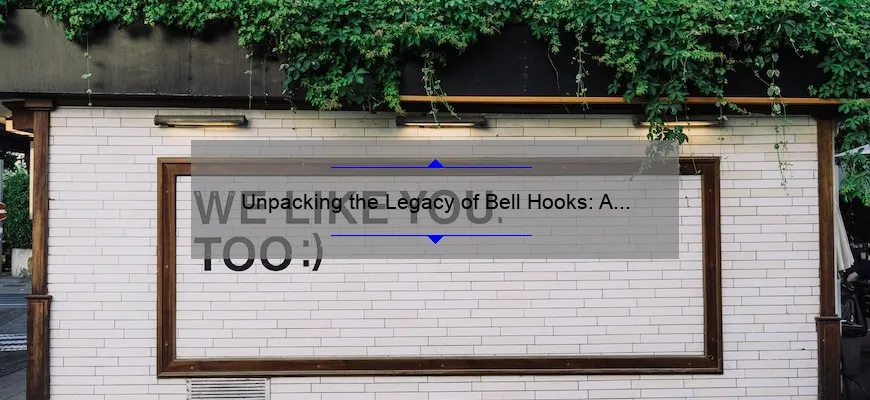Short answer: What did bell hooks do:
Bell Hooks is an acclaimed author, feminist activist, and cultural critic. She has written numerous books on topics such as race, gender, and class and has been a major contributor to the feminist movement. Through her writings and lectures, she has brought attention to issues of intersectionality and the need for systemic change in society.
Exploring the Legacy of Bell Hooks: How She Made a Difference
Bell Hooks, born Gloria Jean Watkins in Hopkinsville, Kentucky, on September 25th, 1952, was a feminist author and activist who made an unforgettable impact on the world through her literary works. She devoted her life to feminism and social justice issues and advocated for change in our society’s perception of gender roles.
Hooks challenged traditional notions of race and gender inequality throughout her career. She believed that women are not inferior but have been made so by patriarchal societies around the world. To challenge these perceptions, she wrote extensively about intersectionality and how different forms of oppression were interlinked in significant ways.
Among others, the groundbreaking title “Ain’t I A Woman: Black Women And Feminism” (1981) gained wide recognition as it highlighted how both black people and women encounter seemingly insurmountable obstacles when considering self-fulfillment while living with “cultural turmoils” such as racism or sexism imposed upon them since birth.
In this illuminating book, Hooks drew attention to the double jeopardy experienced by black women owing to their race & sex segregations/inequalities which leave them alienated from mainstream feminist movements though included within those focused more specifically on racial discrimination faced against communities; subordinating themselves beneath men within sexist environments/slavery/poverty while still unaided rendering them marginalized citizens deprived from achieving full freedom/self-expression even after gaining footing out of hostile conditions.
Her approach provided new insights into African-American literature studies at a time where most critics denied writers like Alice Walker or Toni Morrison deserved inclusion amongst serious scholars due partly because they produced socially conscious ‘women writing’ guided primarily towards remote issues troubled especially Black folks or plights of womanhood regions struggling with real-time adversities encountered regularly.
Over her lifetime Hook’s published over thirty books focusing primarily on themes such as social justice activism; education including systems impacting early childhood development widely explored in “Teaching Community: A Pedagogy of Hope” (2003); cultural discussions, and the intersections between class, race & gender inequalities while enlightening us on bettering relationships to ourselves and each other.
Hooks saw education as a critical factor in promoting social justice but recognized its failings to engender meaningful changes; for most people who drop out or are failed by restrictive systems that ignore their needs it could all simply be directed against them. Her philosophy advocated analyzing intersectionality among diverse experiences so we can encompass radical humanity instead of settling differences notwithstanding levels of privilege/access.
She was one of the first African-American females known to pioneer “cross-racial” coalitions around feminism related matters such as reproductive rights; recognition many hands make light work when supported under feminist movements’ forward collective objectives towards equality despite being stigmatized due partly because she spoke with an unfiltered tongue becoming easily iconoclastic thrust into controversies throughout her career which mostly exposes underlying societal tensions gradually emerging…accomplished through demanding accountability from powerful institutions needing change fully understood by reading “Feminism is for Everybody: Passionate Politics” (2000).
We should remember bell hooks not just for what she achieved during her lifetime but also how impactful those achievements were in creating meaningful waves within our society today.
Undoubtedly, Hooks’s legacy shall forever remain imprinted in history books worldwide leaving behind a formidable footprint which shrunk once hostile territories facading putatively ‘safe-spaces’ meant holders’ disregard otherwise marginalized groups still finding themselves in need of purposeful legal action policies espousing more solace/inculcating awareness outside limitations placed upon individuals borne purely out preconceived notions where every sector becomes inclusive likewise fundamental freedoms needed gain attention if everyone stands together positively altering mindsets alongside end goal creation lasting peace/contentment wherein progressive thinking blossoms and flowers everywhere thereof regardless onto whichever walk journey undertaken next.
A Step-by-Step Guide to Understanding What Bell Hooks Did
Bell Hooks is regarded as one of the most influential cultural critics and theorists of our time. Born Gloria Jean Watkins in 1952, Bell Hooks adopted her pen name as a tribute to her grandmother, an intelligent and strong-willed woman who exerted a significant impression on her.
Over the years, hooks’ body of work has been defined by its critical clarity, literary courage, and ideological consistency – elements that have earned her fame among academics and literary enthusiasts alike.
In this blog post, we will delve into understanding what bell hooks did through a step-by-step guide. Let’s get started!
Step #1: Investigating Identity Politics
Hooks was one of the pioneering voices behind identity politics theory – a term used to describe political activity based on personal traits such as gender or race. She saw it as an essential way for marginalized groups (especially women and non-white populations) to claim visibility within society.
According to hooks, identity politics offered advantages over traditional forms of organizing because it allowed people from different backgrounds to come together around shared struggles while valuing their own individual experiences.
She thus became an advocate for intersectionality – examining how aspects of one’s social position intersect with others in influencing discrimination experienced by individuals/groups- arguing that recognizing differences was vital towards achieving equality between people from diverse backgrounds wholly rather than just espousing tokenistic rhetoric..
Step #2: Promoting Feminism In A New Light
Hooks forged herself both personally and professionally within feminist circles throughout much of her career. Unlike many conventional feminist leaders at the time focusing exclusively on higher education white-centered initiatives-the doors that Hook opened resonated deeply around contemporary feminist discourse not solely around privilege but also significantly reflected inclusive feminisms amplifying all genders’ goals especially those under intersections impacted historically oppressed structural systems like trans exclusionary feminism(TEF).
The new consciousness she evoked showed active leadership action working against patriarchal oppression inside local solidarities acting globally enhanced debates using media, lectures and writings elevating feminist caring as much more than an ideological standpoint. In doing so, Hook made monumental contributions to contemporary feminism while bringing in unique perspectives inclusive of black feminists.
Hook did not restrict her work exclusively to identity politics or the women’s movement. She also sought out new ways of challenging normative social constructs by examining dominant sources such as literature/institutional systems negatively affecting groups that appeared invisible for a long time- like those held captive by racism—illuminating several poets like James Baldwin critiques on civil rights mainstream accommodationist weak sense rather status quo that perpetuated injustices.
Hooks went deeper into tackling issues revolving around self-actualization (personal fulfillment) and how societal expectations hinder people’s ability to rise beyond narrow definitions imposed on them from birth-the likes of sexism/racism/ classism within underrepresented sections disallowing their authentic selves.She initiated dialogues about feelings often kept silent addressing our private fears openly towards optimism reshaping existing narratives making known the unheard voices continuing legacy being heralded all over the world today.
Conclusion
Bell Hooks has indeed been one-of-a-kind in shaking up intellectual institutions and branding herself as a formidable force-an activist invested in merging scholarship with radical thinking working continuously against oppression through re-evaluating forbidden conversations at intersections due to structural exclusions advocating inclusivity amid diversity excelling through critical thought/virtue learning amidst groundbreaking ideas/action/literary creation/statements inspiring legacies positively impacted upon society implementing sustainable approaches aspiring towards freedom/openness turning conservative norms head-first uplifting global spirit rejuvenated since she first entered onto American Revolutions setting historical precedents still resonant till present day .
The impact Bell hook had paved paths toward intersectional studies which reciprocate ideology summing up experiences founded theories enabling diverse best practices intersect opposing models holding back growth poised groundwork for academia & personhood purposely thrust equalities reality for those who remain marginalized working diligently to foster unity via radical inclusivity.
Frequently Asked Questions: Answering Your Curiousity on What Bell Hooks Did
Bell Hooks is a name that often crops up in discussions on feminism, cultural criticism, and social justice. She has made significant contributions to various fields, particularly feminist theory and activism.
If you’re curious about who Bell Hooks is and what she did, here are some of the frequently asked questions:
Q: Who is Bell Hooks?
A: Bell Hooks (born Gloria Jean Watkins) is an American author, feminist theorist, cultural critic, and social activist. She was born on September 25th, 1952 in Hopkinsville, Kentucky.
Q: What are some of her notable works?
A: Some of her most famous books include “Feminism Is for Everybody”, “The Will To Change: Men Masculinity and Love”, “Teaching to Transgress” “All About Love: New Visions,”and “Black Looks Race And Representation”. In total she published over thirty books spanning from children’s literature to critiques on racial politics.
Q: What were her contributions to feminist theory?
A: bell hooks sought out ways to communicate with people on how issues such as race can compound gender inequality – one key concept that she wrote about extensively was intersectionality. Additionally she created dialogues which relate current systems of power including gender dynamics within discussions around white supremacy or imperialism
She also argued against defining women through their relationship with men — a practice known as patriarchy- claiming it perpetuated harm for both oppressed groups because patriarchal norms teach boys/ men they must act dominant while leaving behind softer emotions such as love or nurturing behavior with young children etc.. This leads many male figures feeling stunted emotionally restricting all expressive potential. Simultaneously this harms females increasing objectification tendencies like beauty standards hygiene expectations etc..
Hooks’ approach centered heavily on the experience of Black women by exploring intersections between class status or other forms pf identity oppression along side sexism where these systems overlap . Her work put forth new ideas concerning how to engage in feminist activism effectively while urging individuals not only to critique their oppressors but themselves for double-standards perpetuated by social conditioning.
Q: What is hooks’ philosophy on education?
A: For Bell Hooks, teaching should be a transformative process that empowers students rather than subjecting them to oppressive norms. She believes classrooms should be safe spaces where students are free to express ideas while learning from peers and teachers alike without the fear of being silenced or discredited. Thus she embarked upon an educational reformist mission which challenged structures within academic institutions.
Hooks invested much of her time working with educators administrators parents etc… critiquing existing systems seeking ways knowledge can become accessible at different stages namely altering grade levels K–12 including college structure too alternatives like electronic forums tailored for specific communities such as women who come together via shared interests hobbies goals e.g., gardening cooking creative writing chances expand horizons build support networks beyond convention means
Q: What campaigns was she involved in?
A: bell hooks has been heavily involved in campaigning for various causes throughout her life including equal rights and opportunity; body positivity/ self esteem awareness ; advocacy against abuse (e.g domestic violence) amongst others. Her approach sought out engaging perspectives across disparate groups expanding diversity scenarios whilst remaining ever-conscious enough towards historical trauma catalyzed through generations systemic issues impacting people’s psyches over many years of underrepresented beliefs / practices.
In conclusion, bell hooks’ legacy centers around creating dialogue aimed at challenging societal norms ultimately aiming change interpretations our world more facile nuances operating unseen beneath surface level. Though this brief post fails encompass fullness surrounds her contributions inclusive still poses sufficient details introduce examine certain seminal aspects surrounding some of America’s most radical activist-thinkers today.

